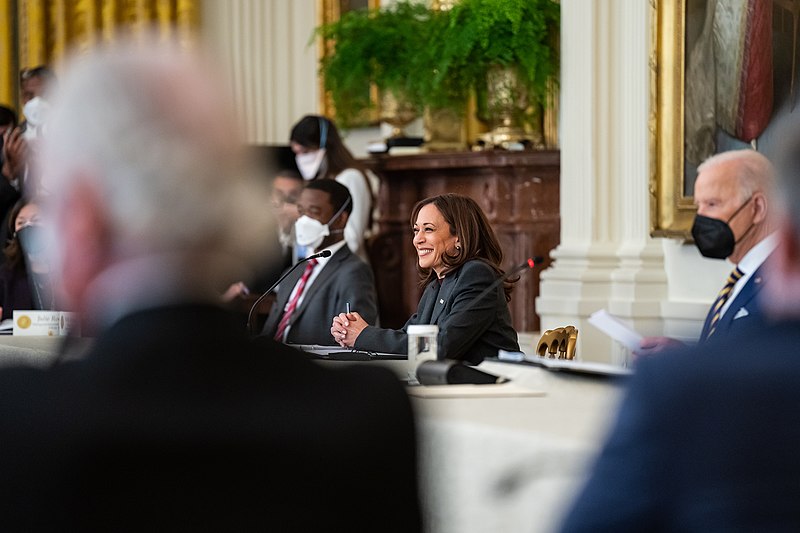US Vice President Kamala Harris announced new corporate pledges to help address the long-running issue of migration in the region. Harris’s office announced that $3.2 billion in investments were made to help the efforts.
Reuters reports that Harris’s office announced that corporate pledges of up to $3.2 billion were made as part of the efforts to address the economic causes of migration from Central America this week. The announcement comes ahead of the Summit of the Americas.
Pledges from companies such as Visa, Inc. and Gap Inc., among others were announced the day before President Joe Biden is set to open the conference, amidst news of the exclusion of Cuba, Venezuela, and Nicaragua from the event.
The move to exclude the three countries has also led Mexican President Andres Miguel Lopez Obrador and other leaders of the region to skip the summit, which may undermine the agenda of the conference. However, 23 heads of state are set to attend, including Brazilian President Jair Bolsonaro.
The pledges that Harris has shored up exceeded the $1.9 billion, adding $1.2 billion in commitments that were made back in December 2021. The pledges aim to create jobs, expand internet access, and bring more people into the formal banking system.
Addressing the influx of migration is among the top priorities of the Biden administration, especially as a record number of migrants are looking to enter the US from the southern border.
Last week, Harris unveiled the White House plan to address global water security, stressing the repercussions that water scarcity has on a country’s security. Harris said the plan will elevate water security into an “international priority” that can prevent conflicts between countries while promoting equity and economic growth.
“Many of our most fundamental national security interests depend on water security,” said Harris, who noted that in many parts of the world, the job of collecting clean water mainly falls on women and girls, who spend hours collecting clean water when they could be studying, working, or spending time with their loved ones.
Harris also highlighted the funding from the bipartisan infrastructure bill for removing lead pipes in the country over the next 10 years that could improve the country’s water infrastructure.



 Federal Judge Restores Funding for Gateway Rail Tunnel Project
Federal Judge Restores Funding for Gateway Rail Tunnel Project  Anutin’s Bhumjaithai Party Wins Thai Election, Signals Shift Toward Political Stability
Anutin’s Bhumjaithai Party Wins Thai Election, Signals Shift Toward Political Stability  Trump’s Inflation Claims Clash With Voters’ Cost-of-Living Reality
Trump’s Inflation Claims Clash With Voters’ Cost-of-Living Reality  Trump Administration Appeals Court Order to Release Hudson Tunnel Project Funding
Trump Administration Appeals Court Order to Release Hudson Tunnel Project Funding  U.S. Lawmakers to Review Unredacted Jeffrey Epstein DOJ Files Starting Monday
U.S. Lawmakers to Review Unredacted Jeffrey Epstein DOJ Files Starting Monday  China Warns US Arms Sales to Taiwan Could Disrupt Trump’s Planned Visit
China Warns US Arms Sales to Taiwan Could Disrupt Trump’s Planned Visit  Netanyahu to Meet Trump in Washington as Iran Nuclear Talks Intensify
Netanyahu to Meet Trump in Washington as Iran Nuclear Talks Intensify  Bangladesh Election 2026: A Turning Point After Years of Political Suppression
Bangladesh Election 2026: A Turning Point After Years of Political Suppression  New York Legalizes Medical Aid in Dying for Terminally Ill Patients
New York Legalizes Medical Aid in Dying for Terminally Ill Patients  India–U.S. Interim Trade Pact Cuts Auto Tariffs but Leaves Tesla Out
India–U.S. Interim Trade Pact Cuts Auto Tariffs but Leaves Tesla Out  Trump Signs Executive Order Threatening 25% Tariffs on Countries Trading With Iran
Trump Signs Executive Order Threatening 25% Tariffs on Countries Trading With Iran  Nicaragua Ends Visa-Free Entry for Cubans, Disrupting Key Migration Route to the U.S.
Nicaragua Ends Visa-Free Entry for Cubans, Disrupting Key Migration Route to the U.S.  Ohio Man Indicted for Alleged Threat Against Vice President JD Vance, Faces Additional Federal Charges
Ohio Man Indicted for Alleged Threat Against Vice President JD Vance, Faces Additional Federal Charges  Trump Says “Very Good Talks” Underway on Russia-Ukraine War as Peace Efforts Continue
Trump Says “Very Good Talks” Underway on Russia-Ukraine War as Peace Efforts Continue  Trump Allows Commercial Fishing in Protected New England Waters
Trump Allows Commercial Fishing in Protected New England Waters  Jack Lang Resigns as Head of Arab World Institute Amid Epstein Controversy
Jack Lang Resigns as Head of Arab World Institute Amid Epstein Controversy 































